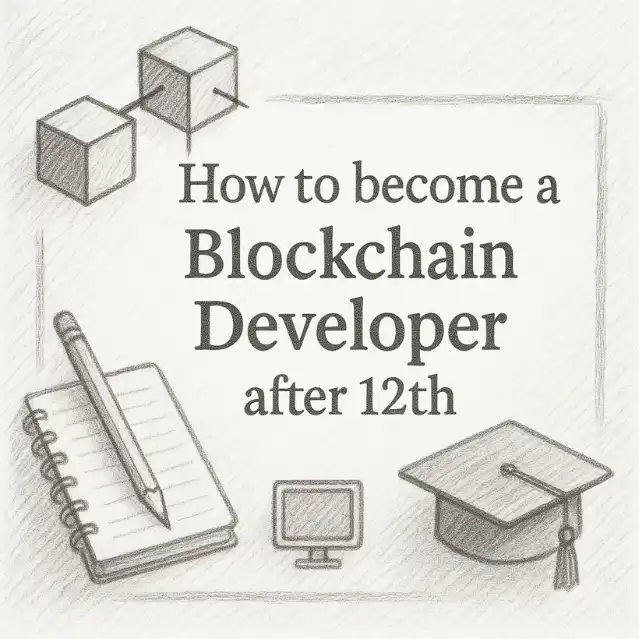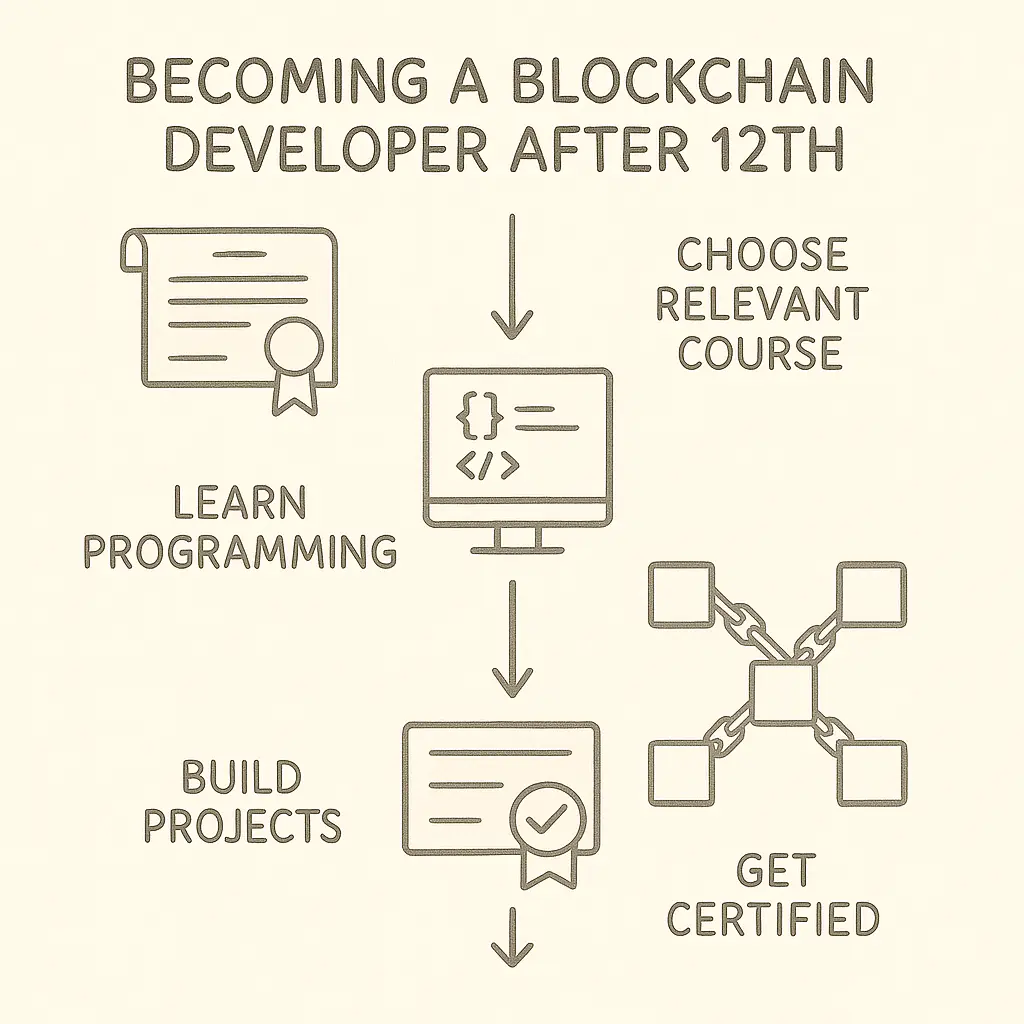How to Become a Blockchain Developer After 12th: The Ultimate 2025 Roadmap

To become a blockchain developer after the 12th, learn programming, master blockchain architecture, build real-world projects, earn certifications, and join global communities. This guide is your one-stop solution for launching a successful blockchain career, covering skills, resources, salaries, and actionable steps for 2025.
Why Blockchain Development Is a Top Career in 2025
Blockchain developers are in high demand. Companies in finance, gaming, supply chain, and healthcare need experts to build decentralized apps, smart contracts, and secure digital assets. Entry-level salaries start at ₹5–12 LPA in India and $121,000+ in the US, with remote work as the norm. The blockchain field offers fast growth, high salaries, and global opportunities.
Skills Every Blockchain Developer Needs
Programming Languages
Start with Python and JavaScript. These languages help you build logic and web apps. Then move to Solidity for Ethereum smart contracts and Rust for Solana.
Python makes backend logic simple.
JavaScript connects websites to blockchains.
Solidity lets you write Ethereum smart contracts.
Rust powers Solana and high-speed chains.
Blockchain Architecture and Consensus
Understand how blockchains work. Learn about blocks, nodes, distributed ledgers, and consensus mechanisms.
Consensus mechanisms (Proof of Work, Proof of Stake) keep networks secure.
Node operations maintain the distributed ledger.
Distributed systems power dApps and smart contracts.
Cryptography and Security
Cryptography protects blockchain data. Learn about hashing, Merkle trees, and digital signatures.
Hashing links, blocks, and keeps data immutable.
Merkle trees verify data quickly.
Digital signatures prove ownership and authenticity.
Data Structures and Algorithms
Data structures like linked lists, trees, and graphs are vital for blockchain. Algorithms help with consensus and transaction validation.
Learn how blockchains use linked lists for blockchains.
Study how consensus algorithms (like PBFT) work.
Practice coding with real-world blockchain problems.
Web Development and APIs
Web development is essential for blockchain. Use HTML, CSS, and JavaScript to build dApp frontends. Connect your dApp to blockchains using APIs like Web3.js and Ethers.js.
HTML and CSS create user interfaces.
JavaScript powers interactivity.
Web3.js and Ethers.js connect your app to Ethereum.
Testing and Debugging
Testing ensures your smart contracts and dApps work as intended. Use tools like Hardhat, Truffle, and Ganache.
Hardhat automates contract testing.
Truffle helps with deployment and debugging.
Ganache emulates blockchains for safe testing.
Soft Skills
Blockchain development requires more than coding. You need:
Analytical thinking to solve tough problems.
Communication skills for team projects.
Adaptability to keep up with new tech.
Step-by-Step Roadmap to Become a Blockchain Developer

Step 1: Build a Strong Programming Foundation
Start with Python and JavaScript. Use Codecademy and FreeCodeCamp for structured learning—practice coding daily on LeetCode.
Write simple apps (calculator, to-do list).
Focus on clean code and logic.
Learn version control with Git.
Step 2: Master Blockchain Fundamentals
Study blockchain architecture, consensus mechanisms, and cryptography. Read the Bitcoin whitepaper. Explore Ethereum.org’s developer portal.
Learn how blocks are created and validated.
Understand how nodes reach consensus.
Explore Merkle trees and cryptographic hashing.
Step 3: Learn Smart Contract Development
Solidity is the main language for Ethereum smart contracts. Use Remix IDE and CryptoZombies for hands-on practice.
Write and deploy contracts on testnets (Goerli, Sepolia).
Study contract structure: functions, variables, events.
Learn gas optimization to reduce costs.
Example Solidity contract:
text
pragma solidity ^0.8.0;
contract SimpleStorage {
uint public storedData;
function set(uint x) public {
storedData = x;
}
}
Deploy and test this contract on Remix IDE.
Step 4: Build Decentralized Applications (dApps)
Learn React for frontend development. Connect your dApp to the blockchain using Web3.js or Ethers.js.
Build a voting dApp or NFT minting platform.
Use MetaMask for wallet integration.
Test your app on Ethereum testnets.
Step 5: Explore Multiple Blockchain Platforms
Don’t limit yourself to Ethereum. Try Solana (Rust), Hyperledger (Go), and Algorand (Python).
Compare features and consensus mechanisms.
Build sample projects on each platform.
Study platform docs (Solana Docs, Hyperledger, Algorand).
Step 6: Security Best Practices
Security is crucial in blockchain. Learn about vulnerabilities like reentrancy attacks and integer overflows.
Use OpenZeppelin for secure contract patterns.
Audit your code and follow best practices.
Step 7: Build a Portfolio and Contribute to Open Source
Employers want proof of your skills. Upload your code to GitHub. Join hackathons and contribute to open-source blockchain projects.
Build and document 2–3 projects (DAO, NFT marketplace, supply chain tracker).
Write case studies and share them on LinkedIn and artofblockchain.club.
Follow Influencers
Join Discord and Telegram groups for networking.
Step 8: Earn Blockchain Certifications
Certifications help you stand out. Choose globally recognized credentials:
Ethereum Certified Developer (ECD): Solidity, dApp security.
Hyperledger Fabric (Linux Foundation): Enterprise blockchain.
NPTEL Blockchain (India): Fundamentals and smart contracts.
B9Lab (EU/UK): Solidity, Ethereum, audits.
Cyfrin Updraft SSCD+: Solidity smart contract security8.
Compare course content, duration, and cost. Pick certifications that match your goals and region.
Step 9: Apply for Jobs and Internships
Use global and local job boards:
Prepare a strong resume. Highlight your portfolio, certifications, and open-source contributions. Practice interview questions and stay updated on industry trends.
Step 10: Stay Updated and Keep Learning
Blockchain evolves fast. Subscribe to Week in Ethereum News, follow top developers on Twitter, and attend virtual conferences.
Join forums and online communities.
Take advanced courses as new technologies emerge.
Keep building and sharing your work.
Blockchain Career Paths and Roles
Blockchain offers many career options:
Blockchain Developer: Build dApps and smart contracts.
Smart Contract Auditor: Review and secure code for vulnerabilities.
Blockchain UI/UX Designer: Create user-friendly interfaces for dApps.
Blockchain Quality Engineer: Test and maintain blockchain platforms.
Blockchain Consultant: Advise businesses on blockchain solutions.
Blockchain Security Specialist: Protect networks and applications from threats.
Blockchain Project Manager: Lead teams building blockchain solutions.
Choose a path that fits your skills and interests. Each role requires a mix of technical and soft skills.
Salary and Job Market Insights
Blockchain developer salaries vary by region and skill.
In India, entry-level salaries are ₹5–12 LPA; seniors earn ₹25–40 LPA.
In the US, entry-level roles start at $121,000, with seniors earning up to $187,000.
In Europe, salaries range from €40,000 to €100,000.
The global average salary for blockchain developers is $150,000 per year.
Remote work is standard, and companies value hands-on experience, platform skills, and open-source contributions.
Global Certifications and Courses
Certifications boost your profile and job prospects.
NPTEL Blockchain (India): Fundamentals and smart contracts.
B9Lab (EU/UK): Solidity, Ethereum, and audits.
Hyperledger Fabric (Linux Foundation): Enterprise blockchain.
Ethereum Certified Developer: Solidity and dApps.
Cyfrin Updraft SSCD+: Solidity smart contract security.
Choose certifications that align with your goals and region. Modern certifications emphasize hands-on skills and real-world projects.
Common Mistakes and How to Avoid Them
Skipping fundamentals: Always master basics before advanced topics.
Not using testnets: Test every contract before mainnet deployment.
Ignoring security: Learn vulnerabilities and audit your code.
No portfolio: Employers want to see real projects.
Not networking: Join communities to learn and find jobs.
People Also Ask (FAQs)
(1) How long does it take to become a blockchain developer after 12th?
Most learners need 9–12 months of consistent study and project work to become job-ready.
(2) Do I need a degree to get a blockchain job?
No. Skills, projects, and certifications matter more than a formal degree.
(3)Which programming languages should I learn?
Start with Python and JavaScript, then learn Solidity for smart contracts and Rust for Solana13.
(4) What are the best certifications for blockchain developers?
Top certifications include Ethereum Certified Developer, Hyperledger Fabric, NPTEL Blockchain, Cyfrin Updraft SSCD+, and B9Lab.
(5) Where can I find blockchain jobs?
Use web3.career, CryptoJobsList, and NASSCOM Blockchain Jobs.
(6) How much do blockchain developers earn?
Entry-level salaries range from ₹5–12 LPA in India and $121,000 in the US.
(7) What skills are most important?
Programming, blockchain architecture, consensus mechanisms, cryptography, and security.
(8) How do I build a blockchain portfolio?
Upload projects to GitHub, contribute to open-source, and share on forums like artofblockchain.club.
(9) What are the top blockchain platforms to learn?
Ethereum, Solana, Hyperledger, Algorand, and Binance Smart Chain.
Action Plan: Your First 12 Months
Months 1–3: Learn Python and JavaScript. Build basic apps.
Months 4–6: Study blockchain architecture, consensus, and cryptography.
Months 7–9: Learn Solidity. Build and deploy smart contracts.
Months 10–12: Build dApps, contribute to open-source, earn certifications, and apply for jobs.
Conclusion: Start Your Blockchain Career Today
Becoming a blockchain developer after 12th is a clear, achievable path. Learn programming, master blockchain architecture, earn certifications, and build real projects. Join global communities, stay updated, and keep building. The blockchain industry rewards curiosity, skill, and hands-on experience.
Ready to begin?
Join artofblockchain.club for mentorship, job alerts, and expert advice.
